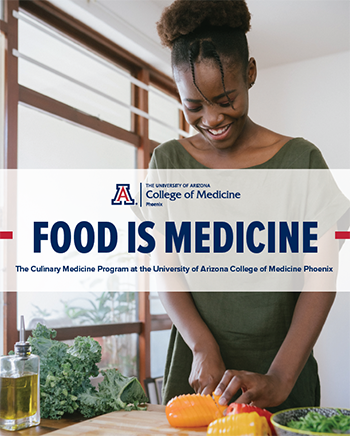Culinary Medicine
Case for Support
Overview
In collaboration with the University of Arizona Cooperative Extension and amazing local chef leaders — Chef Charlene Badman of FNB, Chef Jennifer Caraway of the Joy Bus Diner and Chef Butch Raphael, Executive Chef at Mayo — we are developing an innovative culinary medicine elective for third- and fourth-year medical students.
In this elective, students will be introduced to the emerging evidence-based field of culinary medicine, which blends the art of cooking with the science of medicine. Students will learn the fundamentals of cooking through chef demonstrations and hands-on practice to understand how food can be used in the prevention and treatment of medical conditions such as diabetes, cardiometabolic disease, cancer and obesity. The elective will introduce the concept of food prescriptions to supplement pharmacological or surgical interventions.
Major therapeutic diets and the evidence for and against their use in treating or preventing health conditions — including the Mediterranean Diet, the DASH diet, the ketogenic diet, the bulletproof diet, the vegan or plant based diet, vegetarianism and the discussion of other diets involving changes in macronutrients (e.g. low carb vs high fat, etc.) — will be explored.
Upon completion of the elective, students will accomplish the following measurable learning objectives:
- Analyze how a healthy diet can be incorporated into patient-centered and disease-specific care.
- Discuss the benefits and potential harms of specific diets with patients — e.g. therapeutic diets like the Mediterranean Diet and popular diets like ketogenic diet — and offer basic advice regarding healthy food choices and the preparation of meals for the prevention of disease, reversal and/or management of chronic diseases — such as diabetes, obesity, heart disease, metabolic syndrome, gastrointestinal disorders and cancer.
- Analyze clinical cases and review literature available to present assessment and plan using food prescriptions for therapeutic interventions for a range of chronic and medical conditions.
- Master basic culinary skills to prepare healthy meals using kitchen tools and equipment with the goal of modeling and teaching these skills to patients.
- Develop a practical skillset to facilitate patient coaching and self-care by locating healthy food choices in grocery stores, and incorporating appropriate ingredients for healthy recipes and therapeutic meal recommendations.
- Analyze barriers to maintaining a healthy diet and the role of food policy and social determinants of health to engage patients in a dialogue on how to buy ingredients and prepare healthy meals to promote health and prevent or treat disease.
